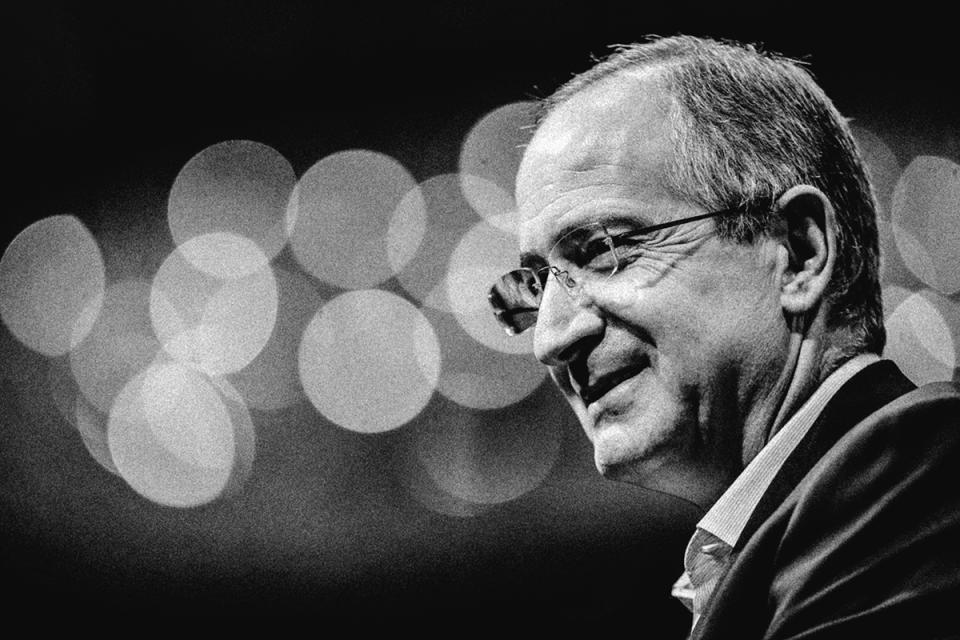As Paramount, WB Discovery and Others Weigh M&A Options, Is More Consolidation Really the Answer to Hollywood’s Profit Problem?

It’s a fundamental business principle: When hard times hit, leaders of struggling companies feel the urge to merge with stronger rivals.
As the new year begins, Hollywood’s largest media conglomerates are hip-deep in a cycle of merger-and-acquisition mania after years of disruption in traditional TV and film, and a particularly chaotic year in 2023. But in the present climate, is getting bigger really the answer?
More from Variety
The Burning Questions Swirling Around the Early Warner Bros. Discovery-Paramount Global Merger Talks
Zaslav Says Warner Bros. Discovery Cutbacks, Including Shelving Movies, Took 'Courage'

It’s becoming clear to many that dealmaking to bulk up on content and distribution assets is no longer the cure for the industry’s problems that it’s been since the 1990 nuptials of Time Inc. and Warner Communications; the threat to Hollywood’s old ways of making money posed by the rise of streaming platforms is too dire and too fundamental.
Yet old habits die hard. The media marketplace is once again rife with speculation about potential M&A transactions — mostly revolving around the fates of Paramount Global, Warner Bros. Discovery and Comcast’s NBCUniversal division. Shari Redstone’s Paramount Global is seen as having reached a grow-or-sell crossroads that has the potential to set other transactions in motion — the pinball effect when one sizable company puts the “For Sale” sign out. (For the record, neither Paramount Global nor Redstone’s National Amusements holding company has commented publicly on the matter.)
The wave of speculation about the future of Paramount comes as the entertainment industry is working through a massive transition when it comes to the way movies and TV shows are produced, distributed and monetized. The streaming services that represent the future for legacy media companies are still racking up billions of dollars in losses. But what’s more concerning is that even if some of the newbie streamers make it to the break-even point, there’s no sign that they’re going to deliver the kind of profits that the studios once mined from sales of hit movies and TV shows.
“No rational business can continue to lose billions and billions of dollars,” says one veteran media CEO. This executive predicts a scenario in which Paramount and NBCU eventually pull back significantly on their investments in content for streamers Paramount+ and Peacock, respectively, with or without a transformative merger transaction.
The news that leaders of Paramount Global have had at least one informal discussion with WB Discovery has so far generated a collective shrug from Wall Street and groans from insiders at both shops. The prospect that Comcast might jump into the mix as it considers options for NBCU has added intrigue but not much excitement. Paramount Global, NBCU and WB Discovery in varying degrees are suffering from the same problem: The onetime bedrocks of their businesses — cable TV channels and box office receipts — are shrinking. In this scenario, it’s hard to find the long-term rationale for bringing together loss-generating streamers and aging cable channels, as would be the case for any combination among Paramount Global, WB Discovery and NBCU.

The bigger-versus-better conundrum helps explain why Paramount Global is also the focus of stealth discussions between David Ellison’s Skydance Media and Paramount Global parent company National Amusements Inc. (NAI). Skydance, a much smaller entity formed in 2010 by a well-heeled entrepreneur with big Hollywood ambitions, isn’t saddled with the same problem of figuring out what to do with legacy assets. But it’s highly unlikely that Skydance would pay a premium for everything under the Paramount umbrella, as is typically the case when a smaller entity buys a larger one. A source close to the situation emphasizes that discussions to date have been held at the NAI level and thus a layer removed from Paramount itself. However, NAI’s financial strain has been exacerbated by Paramount’s move in May 2023 to slash its quarterly dividend (from 24 cents a share to 5 cents) for the first time in more than 10 years as it faced headwinds from losses racked up by Paramount+, a weak advertising climate, general economic uncertainty and the start of what would prove to be a five-month strike by the Writers Guild of America. It was the perfect storm that has, by multiple accounts, forced Redstone to seriously consider parting with some or all of NAI’s controlling stake in Paramount.
Long before the Skydance rumors heated up, Redstone has consistently stated that she is open to options that will put Paramount Pictures and its corporate siblings in the best position to succeed over the long term in a rapidly changing media universe. To that end, a merger between two legacy media companies won’t solve the endemic problem that industry players are facing, says John Peters, Accenture’s media and entertainment lead in North America. Such a combination could improve overall cost structure, “but it doesn’t help your ability to get into fast-growing markets,” he says, adding, “You’ve increased the size of the lifeboat, but you’re still heading toward the waterfall.”
Simply put, Hollywood is worn out from what one analyst describes as the “media M&A merry-go-round” of recent years — notably AT&T and Time Warner in 2018, Disney and 21st Century Fox in 2019, Viacom and CBS (which became Paramount Global) also in 2019, followed quickly by the WarnerMedia and Discovery transaction completed in April 2022. Meanwhile, the quickening pace of the rumor mill has tens of thousands of employees across Paramount and Warner Bros. Discovery bracing for more corporate turnover and possible layoffs barely four years after Viacom and CBS Corp. came together to form Paramount Global and just two years after AT&T’s WarnerMedia and Discovery were united in a complex transaction.
More talk of M&A is starting to feel like a shell game to the industry rank and file, who question the logic of continuing to bulk up when traditional entertainment giants are struggling against changing tides. They’re now directly competing with tech giants — Apple, Amazon, Netflix and Google — that have exponentially more resources and stronger balance sheets.
Still, Jessica Reif Ehrlich, senior media and entertainment analyst at BofA Merrill Lynch Global Research, is not as skeptical as some about the chances of another transformative deal coming to fruition between legacy Hollywood studios. The companies that are in the M&A fishbowl right now should be talking to everybody, she says. “You can make arguments about who is the best fit with whom, what the deal structure should be, but there are so many combinations you can ponder through, and some of them could be really interesting. And they may not be what people expect; there could be mergers of some or all of a company’s pieces, and there’s certain combinations that would really create industry power.”

Players across the spectrum, including Disney, Paramount, WB Discovery and NBCU, as well as Netflix and others, have been through a hard year of cuts as they realign streaming business plans to meet lowered expectations. According to an analysis from Morgan Stanley, the largest media conglomerates have written off some $8 billion in content costs over the past 18 months that will never be recouped. Call it the Peak TV hangover.
In this landscape, every media company is “on the table at some level,” says Doug Creutz, TD Cowen senior media analyst. But Creutz believes a major M&A deal is unlikely to transpire within the next 12 months. “There are not enough buyers, and there are too many risks. There’s a lot of talk. But who’s actually going to pull the trigger? It’s not really clear anybody is going to step up,” Creutz says.
Big Tech hasn’t shown much interest in snapping up a marquee Hollywood name, aside from Amazon’s relatively small $8.5 billion acquisition of MGM in 2022. Netflix doesn’t seem to need to acquire a studio or production company, especially after building out the infrastructure to commission original series and movies from producers around the globe. That said, if the House of Tudum is ever going to pounce on big-time Hollywood assets, now would be a good time to go hunting for bargains.
No media company is reaching a crossroads this year quite like Paramount Global. The company derives the vast majority of its earnings from the most pressured areas of media, namely ad-supported linear TV channels, including MTV, Nickelodeon, VH1, Comedy Central, BET and CMT. Broadcast network CBS, meanwhile, is a stronger business overall thanks in large part to its pricey NFL rights package. But the Tiffany network will be hard-pressed to be the driver of significant growth for the entire company.
On the film side, Paramount Pictures has struggled just like its bigger rivals to find the right portfolio of theatrical and made-for-streaming releases. “Top Gun: Maverick” was a runaway box office hit in 2022, but blockbusters of that scale are few and far between. More recently, Paramount Pictures took hits on such costly underperformers as “Transformers: Rise of the Beasts,” “Dungeons & Dragons: Honor Among Thieves” and “Mission: Impossible — Dead Reckoning Part One.”
Moreover, the franchise fever that has gripped filmdom for the past decade, thanks to Disney’s success with the Marvel Cinematic Universe, is cooling alongside Marvel’s box office fortunes. That’s bad news for Paramount, which in recent years has heavily mined derivatives of marquee properties ranging from “Star Trek” to “SpongeBob SquarePants” to “South Park.”
Paramount Global has poured resources into the launch of its Paramount+ streamer since early 2021. It also got ahead of the ad-supported streaming boom with its purchase of the Pluto TV platform in 2019. Much like WB Discovery’s streamer Max, Paramount has gambled that Paramount+ and Pluto can rev up as profit engines while linear assets slowly but surely run out of gas.

Redstone, who serves as its non-executive chair, is likely to face hard choices in the coming months. The company’s stock price has sunk, valuing the entirety of the company at about $9.5 billion, or roughly a third of its $30 billion valuation at the time of the Viacom-CBS merger. Meanwhile, the company’s debt load has ballooned to $15.6 billion due to increased spending on content. Even with the most optimistic projections for a turnaround, those numbers are not sustainable. Rising interest rates for long-term debt only add to the pressure Redstone and her management team, led by CEO Bob Bakish, face to right the ship. Bakish told investors last year that 2023 marked the company's "peak investment" year in Paramount+, which as of last year has been bundled with a digital iteration of the company's linear Showtime pay TV service. That's a strategy shift designed to get ahead of the cord-cutting that has dented Showtime's linear subscriber base. It also has the benefit of expanding Paramount+'s programming menu and allowing the company to raise the monthly price (from $9.99 to $11.99) of its top-tier, ad-free streaming package, now billed as Paramount+ with Showtime.
Paramount Global is not alone in enduring harsh scrutiny. For months, Disney has been in a public battle with activist investor Nelson Peltz, who is questioning and criticizing moves by CEO Bob Iger, once seen as invincible on Wall Street for his success in building Disney through expertly timed acquisitions of such sui generis properties as Pixar, Marvel and Lucasfilm. Now Iger is getting second-guessed on his bold move to make the biggest purchase of his career — Disney’s $70 billion acquisition of 21st Century Fox. Peltz, who owns about $3 billion worth of Disney stock through his Trian Partners private equity firm, is waging a classic activist-investor pressure campaign to force Disney to make strategy shifts and install new members onto its board of directors. Peltz argues that Disney has spent too much money on building up streaming businesses, that executive compensation is too high given the slump in its stock price, and that its board of directors has been too cozy with Iger.
Like Paramount, WB Discovery is also feeling the pain of a stock price that hasn’t topped $20 since the AT&T-WarnerMedia spinoff was finalized in 2022. The transaction left the newly formed entity to shoulder an enormous $55 billion in debt, which has become even more difficult to manage in a world of tighter credit and the vicious circle of lenders charging high interest rates for companies that have big debts on the books.
WB Discovery CEO David Zaslav has assured Wall Street that Max and HBO have turned the corner on losses and will operate at a break-even point this year. Even so, there are whispers among showbiz bankers that WB Discovery may wind up tangling with activist investors pushing an alternate strategic agenda and management changes, as Peltz is doing with Disney. Zaslav’s interest in Paramount Global could be driven in part by his desire to make the company even bigger — thus harder for an outside entity to swallow up at a lowball price.
Speculation has also emerged that Zaslav made a public show of courting Paramount in order to force the hand of Comcast CEO Brian Roberts. WB Discovery has been seen by analysts and industry insiders as a likely candidate to merge with NBCUniversal. The Machiavellian theory at work here is that Zaslav is trying to convince Comcast to sell NBCUniversal to WB Discovery before his company buys Paramount Global. Otherwise, the combined WB Discovery-Paramount would be too big to buy NBCU. This scenario presumes that Comcast is looking for an exit strategy on its ownership of NBCU, which it acquired in early 2011. A knowledgeable source close to WB Discovery characterizes this rumor as “nonsense.”
But any clear-eyed observer of the marketplace can see that WB Discovery is logically an attractive buyer for either Paramount Global or NBCUniversal, because at present WB Discovery doesn’t own a Big Four broadcast network or major-market TV stations. U.S. law bars a single company from owning more than one of the major broadcast networks: ABC, CBS, NBC and Fox. If Paramount and NBCUniversal were to consider a merger, it’s legally a given that either CBS or NBC would have to be divested.
If WB Discovery makes good on its promise that the days of incurring heavy financial losses on Max are over, then it’s in the prime position to wait for the right price to emerge on potential acquisitions. WB Discovery also has bragged to Wall Street that, for the near term, it can still count on healthy free cash flow from CNN, TNT, Discovery Channel, TLC, OWN and other ad-supported basic cable channels in its portfolio. Free cash flow isn’t synonymous with old-fashioned profit, but it means that a company has enough cash in the bank to fund operations without the need to take on more debt.
WB Discovery’s fortunes have also been significantly boosted by two surprise megahits last year: “Barbie,” which raked in $1.4 billion in worldwide box office, and video game “Hogwarts Legacy,” which generated $850 million in revenue in its first two weeks of release last February. Those windfalls, coupled with massive cost cutting since the merger closed, have helped the company trim its debt load to about $43 billion as of Q3.
WB Discovery’s improving financial situation gives it some flexibility, even in a tough marketplace. A deal may still take a year or so to emerge, but all eyes and ears will be on Zaslav’s moves in the coming months. So too Paramount’s Redstone.
The traditional media biz is ripe for consolidation, argues Kevin Westcott, Deloitte’s U.S. tech, media and telecom leader. He predicts deal activity will pick up if interest rates keep going down and the broader macroeconomic clouds that darkened 2023 clear up.
“There’s a ton of money sitting on the sidelines looking for investments,” Westcott says. “I think everybody’s sitting on their dry powder and saying, ‘Let’s see where the economy is going.’”
Best of Variety
Sign up for Variety’s Newsletter. For the latest news, follow us on Facebook, Twitter, and Instagram.


